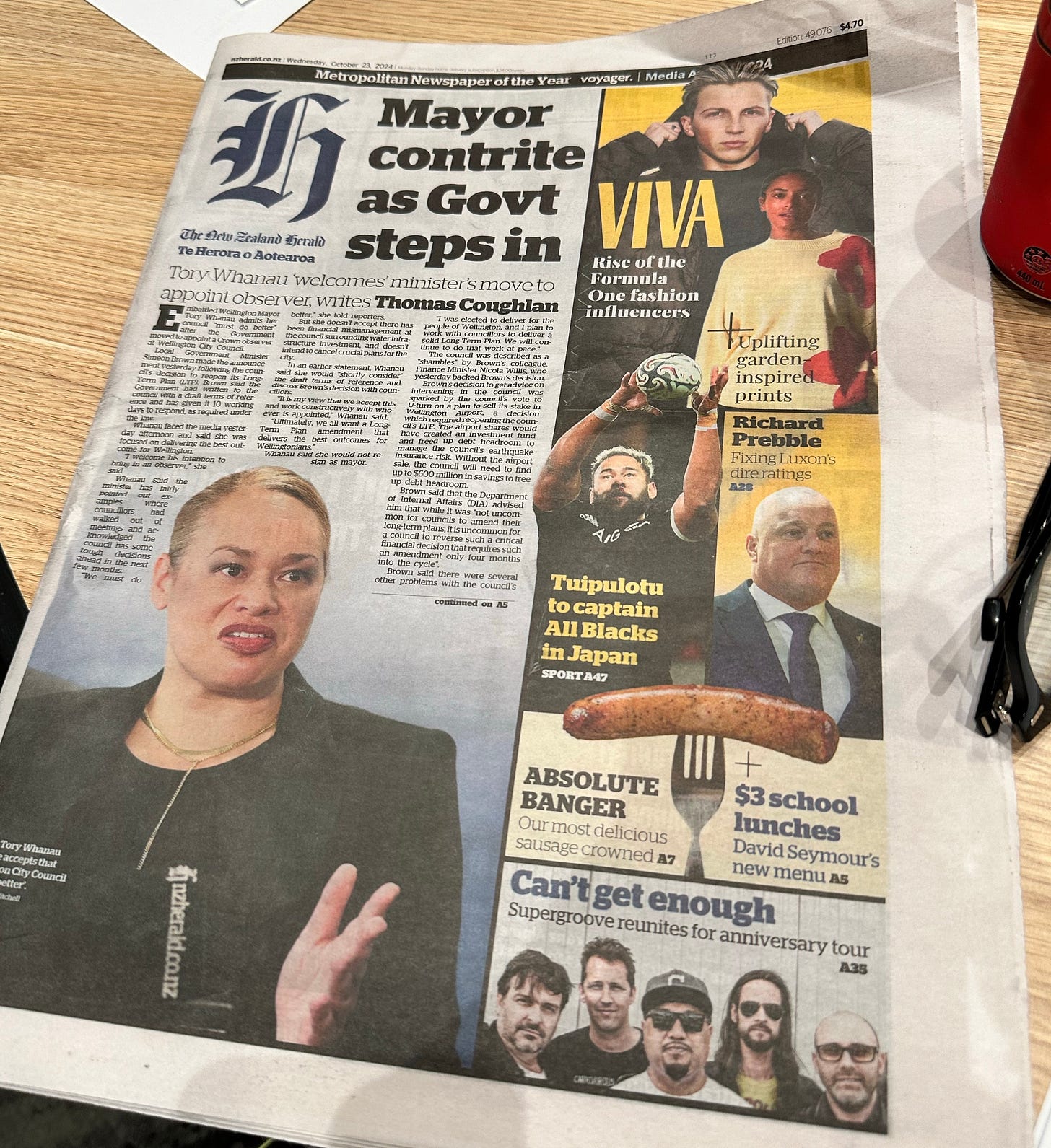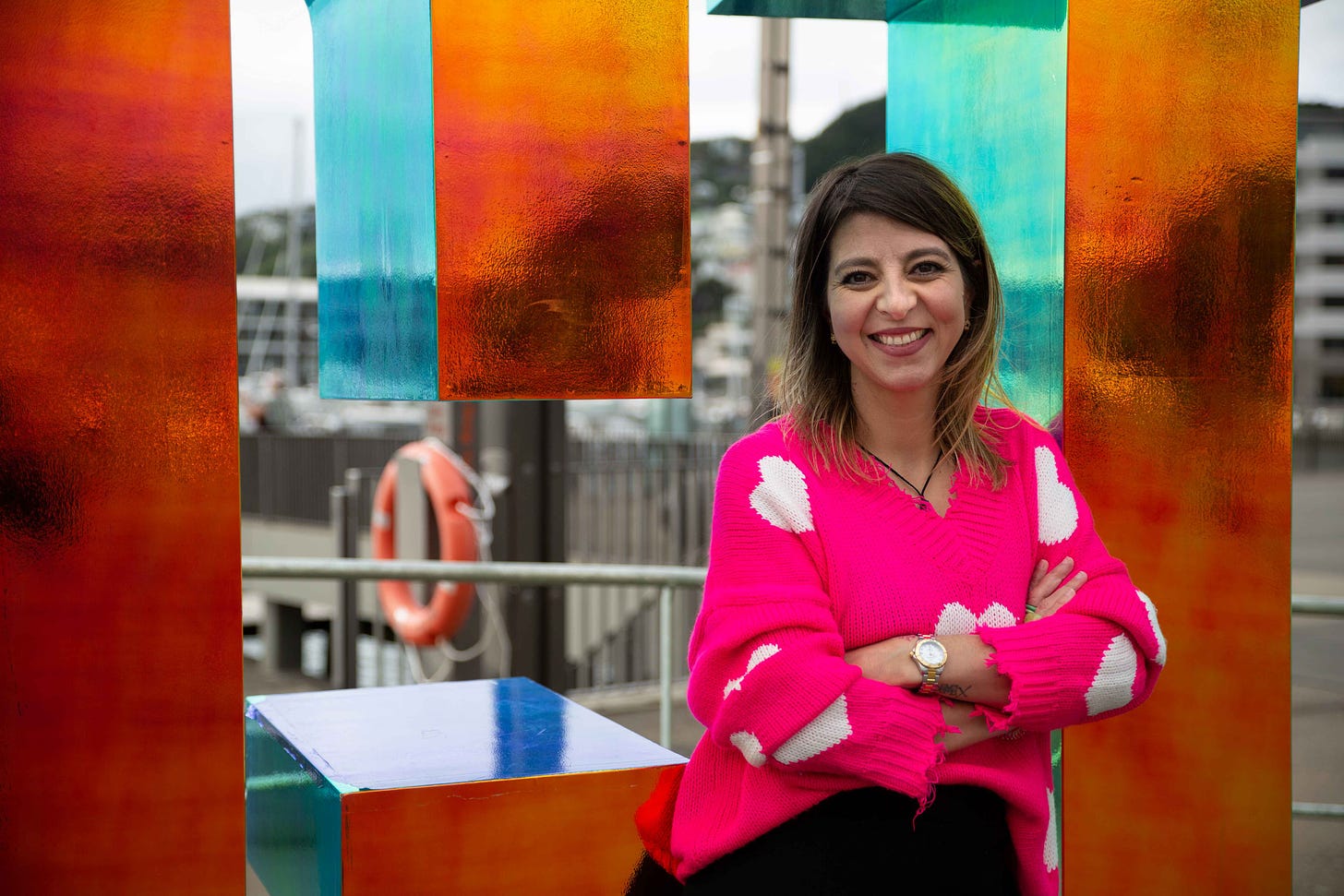Wellington Chaotic Times and what the Crown Observer Means
With headlines of a Crown Observer and crumbling pipes, is Wellington’s governance failing, or is there hope for change?
Last week, while attending a hui in Hamilton, I stopped by a dairy for a drink and picked up the New Zealand Herald. There was Tory Whanau, front and centre, under the headline: "Mayor Contrite as Govt Steps In." My first reaction? A deep sigh. The relentless cycle of confusion, criticism, and chaos surrounding Wellington's leadership feels never-ending. Part of me wants to check out, ignore the noise, and move on. But I know better than to do that.
So, is Tory really on the ropes? Or is there a bigger story about how local governance and management is—or isn't—working in the capital? Honestly, who knows? But here's what I do know: it's going to take all of us to break free from this cycle of pessimism, division, and both perceived and real incompetence from our current political leadership.

Wellington's Leadership Void: Breaking the Cycle of Chaos
This past week has been filled with headlines about Wellington again. From even the Greens opposing cycleways to reports suggesting it could take 6,388 years to repair the city’s deteriorating pipes. Random controversy swirled around Mayor Tory Whanau, whose Instagram account liked comments labelling government intervention in the council as a “disgraceful hit-job” and suggesting corruption among politicians, which I think seems petty at worst and poitically irresponsible at worst. So, in the storm of allegations of incopetence earlier this year, the government has appointed a Crown observer to oversee the city council.
It’s a lot to digest, and the mood in the city ranges from frustration to outright apathy. But this situation isn’t just about one mayor or council. Even Tamatha Paul, with her strong political mandate and talent, is struggling to show active, visible leadership in this political climate. What’s happening in Wellington raises broader questions about governance and what we expect from our local leaders. Breaking out of this cycle of negativity, perceived council incompetence, and the leadership vacuum in Wellington will require all of us to engage.
The Crown Observer: More Symbolic than Substantial
The announcement of a Crown Observer feels like a bold move—government intervention at the local level always does. I don’t think its a surprise to anybody or something that is unwarranted; I actually welcome it. But in reality, the observer’s role is limited. They can offer advice, monitor the council’s performance, and report back to the government, but they don’t have any real power to make decisions.
The way the council handled key issues like the Reading Cinema and Wellington Airport ownership debacles was disappointing, to say the least. If nothing else, the council has a serious PR problem. While the Crown Observer may smooth over some of the internal chaos, the core issues remain.
What I’d like to see from Tory Whanau is more specificity. She needs to move away from vague statements about things being either “fine” or “too complicated” and start articulating her leadership vision more clearly. I’ve heard her say that she doesn’t have as much power as people think—she’s just one voice around the table. But that’s a naïve take and, frankly, an irresponsible one. She is the Mayor and has the resources, mandate, and role to Lead and not coward behind vague, narrow, and irresponsible statements. And to be crystal clear, leading isn’t about how hard she is working. I am sure she is running as hard as she can, but thats not leading. Leading means providing stable, constant, visible information; taking responsibility and stearing a big, complex, messy ship in a direction we can trust will get us to shore.
I've been a supporter of Tory and Tamatha, and I want to see them succeed, even if I disagree with some of their politics. After all, Wellington is greener than ever, and the two of them have the strongest mandate the Greens have ever had in this city. But leadership also means taking responsibility. And right now, that’s what we need most.
The Crown Observer: What’s the Real Impact?
Georgina Campbell’s piece shed light on the fact that the Crown observer has been in the wings since January. This didn’t come out of nowhere—it’s been building for months. Tory Whanau may be facing the brunt of the criticism, but she’s not alone in carrying Wellington’s governance problems. The real question is: what does this observer actually mean for us?
In my view, the appointment of a Crown observer is more symbolic than material. It’s a light form of central government accountability, a gesture of oversight without much substance. The observer doesn’t have decision-making power—just the ability to monitor, guide, and report back. It feels more like an attempt to show that something is being done rather than an actual solution to Wellington’s deeper issues.
Wellington will take all of us to thrive
And here’s the real kicker: voter turnout is on the decline. As Grant Miller pointed out, declining participation in local elections is now being called an “existential threat to local government.” People are checking out. They’re tired, disillusioned, and exhausted by what feels like never-ending dysfunction. But here’s the problem—this is exactly the moment when we need people to lean in, not check out.
If we’re not showing up at the polls or engaging in conversations about how our city is run, how can we expect change? This is where platforms like Less Certain Chat come into play. It’s not just about venting frustration—it’s about figuring out what each of us can do to make a difference. How can we uplift, inform, and help shape the future of Wellington?
We’ll Lift Where We Stand
I’ll end with something Helmut Modlik said: “We’ll lift where we stand.” It’s so easy to criticise our local leaders and point out everything that’s going wrong. But at the end of the day, we all have a role to play. Whether it’s engaging in the Less Certain Chat, voting in local elections, or simply staying informed, each of us can do something to help.
Wellington is at a crossroads. Our leadership, our infrastructure, and our engagement with local government are all in question. But this also presents us with an opportunity—right now, we have the chance to lift where we stand and make a difference.
So, what will you do? See you next week!





This article is why I subscribe to your channel. I’m from Auckland, and for me Wellington is kind of … meh. But your passion, optimism and clarity in this piece lifts me out of my chair. I expect that one day you will be a politician/leader to reckon with. Onya!
You didn't mention the Vision for Wellington initiative. Isn't that an example of leadership and a positive move?